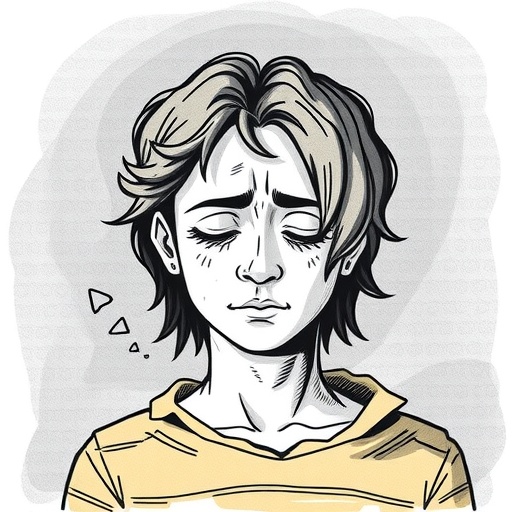A groundbreaking longitudinal study has shed light on the complex relationship between stress sensitivity and the manifestation of suicidal thoughts within university populations. Coordinated by the Hospital del Mar Research Institute in collaboration with Pompeu Fabra University, this extensive research utilized intensive survey methodologies to analyze data from over 700 university students, unveiling critical new insights into how stress modulates the frequency, intensity, and variability of passive suicidal ideation.
Suicide remains a leading cause of mortality among young individuals globally, and particularly dominates as the primary cause of death for those aged 15 to 29 within Spain. Despite its considerable societal impact, suicide’s multifactorial etiology and pervasive stigmatization have hindered comprehensive understanding, predictive capability, and efficacious preventive strategies. This study addresses a significant gap by delineating how individual differences in stress sensitivity influence the dynamic characteristics of suicidal ideation over time.
Utilizing ecological momentary assessment (EMA), researchers collected self-reported data on passive suicidal thoughts and negative affect every evening for a consecutive 14-day period, followed by a longitudinal follow-up 12 months later. This real-time data capture mitigated recall bias and afforded granular insights into temporal fluctuations. Negative affect, a psychological construct encompassing the propensity to experience aversive emotions such as anxiety, guilt, and hostility, served as a proxy to quantify stress sensitivity—the heightened emotional reactivity to stressors observed in certain individuals.
Crucially, this work pioneers the classification of passive suicidal ideation into three discrete subtypes distinguished by their frequency, intensity, and intra-individual variability. Individuals categorized in the higher severity groups demonstrated suicidal thoughts nearly every alternate day, marked by stronger and more persistent ideation without explicit intent or planning. This dimensional stratification challenges prevailing approaches that homogenize suicidal ideation into a monolithic construct, thereby obscuring nuanced etiological mechanisms.
Stress sensitivity emerged as a potent amplifier of suicidal ideation dynamics. Participants exhibiting heightened stress reactivity not only experienced more frequent and intense persistent thoughts but also demonstrated increased variability, meaning the intensity of ideation fluctuated more markedly day-to-day. This was particularly evident in individuals with the most severe ideation profiles, suggesting stress sensitivity drives both the maintenance and the instability of suicidal thoughts, factors known to elevate risk.
The implications of this discovery are profound. By differentiating between sporadic, less intense ideation and chronic, recurrent patterns mediated by stress response systems, mental health practitioners gain a refined lens for risk assessment and intervention prioritization. Lead author Ana Portillo-Van Diest highlights that prior conflation of all suicidal ideation under a singular category hindered detection of causal correlates and extraneous influences on mental health trajectories.
Moreover, Philippe Mortier, a key investigator on the project, notes that while the study did not isolate a distinct subgroup characterized by intense but low variability ideation—typically associated with elevated suicide attempt rates in clinical samples—monitoring stress sensitivity could nonetheless flag individuals at impending risk. This adds another layer of predictive power to preventive frameworks which often rely on cross-sectional snapshots insufficient to capture ideation evolution.
A pivotal aspect of the study lies in its 12-month longitudinal component, which confirms that severe, frequent passive suicidal ideation tracked during the initial assessment phase robustly forecasts subsequent active ideation involving planning and intent, alongside actual suicidal behavior. These findings call into question outdated perceptions minimizing the clinical gravity of passive ideation, repositioning it as a critical antecedent to more overt suicidal actions.
The study’s outcomes advocate for targeted strategies addressing stress regulation as a means of suicidality mitigation within university settings. Techniques such as mindfulness-based stress reduction could attenuate the heightened emotional sensitivity linked to stress, thus potentially disrupting the trajectory from passive ideation to active suicidal behaviors. Such interventions, integrated within mental health services on campuses, might substantially curb the incidence of youth suicide by buffering against stress-induced amplification of suicidal cognition.
Embedded within the broader PROMES-U project, this research contributes to a systemic effort aimed at enhancing mental health in university populations by elucidating mental health determinants and evaluating scalable online preventive interventions. The large, multi-institutional cohort spanning six Spanish universities strengthens the generalizability of the findings and underscores the widespread relevance of the identified suicide risk mechanisms.
In summary, this study represents a seminal advancement in suicide research by combining methodological innovation, substantial sample size, and longitudinal design to unravel the role of stress sensitivity in dynamic, ecologically valid assessments of suicidal ideation. Its revelations not only recalibrate clinical conceptualizations of suicidality but also inform the development of nuanced, evidence-based prevention models attuned to the intricate interplay of psychological stress reactivity and suicidal cognitions.
Subject of Research: People
Article Title: Subtypes of suicidal ideation among university students – An ecological momentary assessment study
News Publication Date: 11-Jul-2025
Web References:
https://www.sciencedirect.com/science/article/pii/S0165032725013072?via=ihub
References:
Mortier P, Portillo Van-Diest A, Alonso J. Subtypes of suicidal ideation among university students – An ecological momentary assessment study. Journal of Affective Disorders. 2025.
Image Credits:
Pompeu Fabra University
Keywords:
Mental health, Stress management, Psychological stress, Suicide
Tags: challenges in understanding suicide etiologyecological momentary assessment in mental healthimpact of negative affect on suicidal thoughtslongitudinal study on suicidal thoughtspassive suicidal ideation and stresspredictors of suicide among young adultspreventative strategies for youth suicidereal-time data in mental health studiesrelationship between stress and suicidal ideationsignificance of individual differences in suicide riskstress sensitivity in university studentsuniversity mental health research





